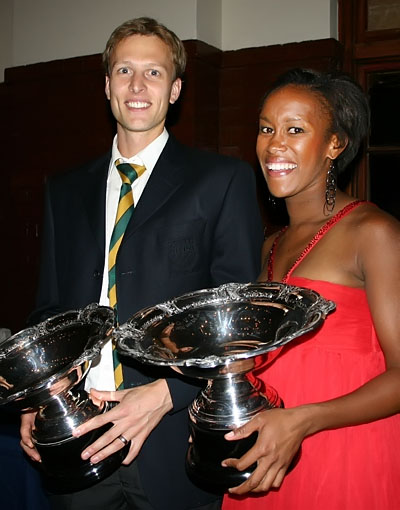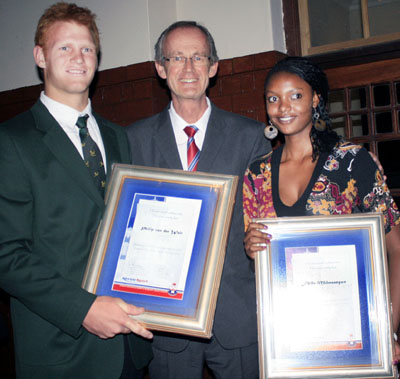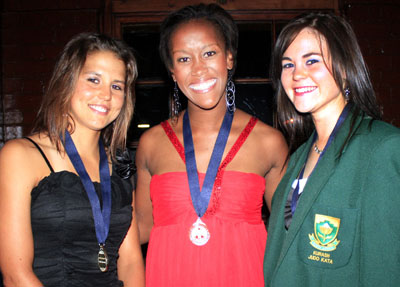 |
Johan Cronjé and Lesley-Ann George, the UFS’s Sportsman and Sportswoman of 2010.
Photo: Leonie Bolleurs |
 |
Junior sport stars: Prof. Teuns Verschoor (middle), Acting Senior Vice-Rector with the UFS's,Junior Sport Stars of the Year: Philip van der Walt (Rugby) and Fikile Mkhuzangwe (Netball).
Photo: Kabelo Tlhabanelo
|
 |
Kovsie Sports Woman of the Year candidates are from the left: Nelmaré Loubser (Triathlon and Duathlon), Lesley-Ann George (Hockey) and Tanya Basson (Judo).
Photo: Kabelo Tlhabanelo
|
 |
Kovsie Sportman of the Year candidates are from the left: Thuso Mpuang (Athletics), Philip van der Walt (Rugby), Boom Prinsloo (Rugby), Bruno Schwalbach (Karate), Johan Cronjé (Athletics), and Windy Jonas (Athletics).
Photo: Kabelo Tlhabanelo |
KovsieSport at the University of the Free State (UFS) honoured its top sports achievers during a prestige dinner in die Centenary Complex on the Main Campus in Bloemfontein last night. The Kovsie Sportsman and Sportswoman of the Year were also announced at this event.
Johan Cronjé was named the Sportsman of the Year. He represented South Africa at the Africa Athletics Championships. He was also invited to participate in the Grand Prix Athletics Championships in Europe. Currently Johan also holds the 38th position on the world-ranking list for the best achievement in the 1 500 m.
Lesley Ann George was named as the Sportswoman of the Year. She is a member of the South African Women’s Hockey Team which participated in the Hockey World Cup and Commonwealth Games. At the last event this team came fourth. She is also a member of the South African Women’s Hockey Team that participated in China. Lesley-Ann is also the Vice-Captain of the South African Women’s Hockey Team.
Lesley Ann furthermore made history; she is the first black UFS athlete who has been named as a Kovsie Sportswoman of the Year.
Philip van der Walt (rugby) and Fikile Mkhuzangwe (netball) was named as the Junior Sportsman and Sportswoman of the Year.
According to Mr Frans van der Watt from KovsieSport at the UFS, this was the largest attendance of supporters ever who attended this event during which the UFS honoured its international sports stars.
Sport stars and supporters alike were all inspired by the guest speaker of the evening, Mr Bruce Walsh, a victim of a bomb explosion in Planet Hollywood in 1998, to be winners at a physical, intellectual, emotional and spiritual level.
Media Release
Issued by: Lacea Loader
Director: Strategic Communication (actg)
Tel: 051 401 2584
Cell: 083 645 2454
E-mail: loaderl@ufs.ac.za
22 October 2010